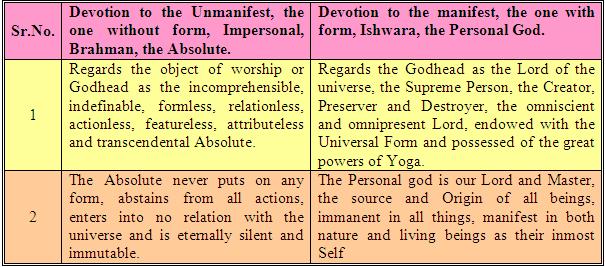Preamble
Bhagavan Sri Krishna has in many places laid stress on the importance of the worship of the formless and attributeless Brahman. In the end of the last Chapter, He declared God-Realisation as the reward of exclusive devotion to God with form and attributes and that through single-minded devotion, the Cosmic Form can be known, seen and entered into by anyone.
On hearing this advice a doubt has arisen in the mind of the Pandava hero Arjuna as to which of the two methods is better to attain the spiritual realisation. He seeks the precise knowledge regarding the techniques of devotion. He begins the chapter with the perennial question that confuses mankind. Should one worship God with a form or as a formless Reality i.e., whether the Truth is to be meditated upon as unmanifested Absolute or in its manifested form?
Sri Krishna answers by explaining the importance of both types of worship to spiritual development, one catering to the devotional while the other to the intellectual propensity of the seekers.
Krishna then presents the most pragmatic approach to God Realisation. For seekers who find it difficult to practise various spiritual disciplines (sadhanas), He provides a series of alternatives which cater to the needs of diverse kinds of aspirants. He concludes the chapter by enumerating thirty five qualities of a devotee (bhakta) of God. He emphasises that those who possess these qualities are dear to Him.
This Chapter thus deals mainly with devotion to God along with various forms of spiritual disciplines and discusses the marks of a true devotee. As the Chapter begins and ends with devotion it is titled the Yoga of Devotion.
The Text
DEVOTION AND CONTEMPLATION
arjuna uvaacha
evam satatayuktaa ye bhaktaas twaam paryupaasate
ye chaapyaksharamavyaktam teshaam ke yogavittamaah // 12.1 //
Arjuna said
Those devotees who, ever steadfast, thus worship You and those who worship the Imperishable and the Unmanifested - which of them have the greater knowledge of Yoga?
In the last Chapter the Lord assured that any seeker can realise the glory of the Cosmic Form if he has unfaltering devotion. Arjuna now enquires whether one should meditate upon the manifested form of the Infinite or upon the unmanifested form of the Supreme. Unmanifested is that which is not directly perceptible for the sense organs. The objects that can be perceptible to the sense organs are the manifested.
There are those who seek oneness with the Absolute, one impersonal and unrelated to the universe and others who seek unity with the Personal God manifested in the world of men and nature. The question is which of these have the better knowledge of Yoga- the one who devotes himself to the Lord manifest, Personal God, or the one who meditates on the unmanifested Infinite with complete detachment from all the external stimuli? Are we to turn our back on all manifestations and strain after the Unchanging Unmanifest or are we to be devoted to the Manifested Form and work to its service? Is it Absolute or the Personal God, Brahman or Ishwara that we should worship?
The difference between the devotion to the ‘Absolute or Brahman or the Unmanifest’ and devotion to the ‘Personal God or Ishwara or the Manifest’ is explained in the following table.

Both these aspects of the Godhead have been described by Krishna in the Gita, though with an emphasis on the Impersonal aspect in Chapters 2 through 10. The 11th Chapter deals with the Universal form of Godhead and ends with an exhortation to Arjuna to worship It as the Lord of the universe. Now Arjuna asks which of the two methods of worship is better; meditation on the Impersonal or worship of the Lord through work and love. However the Bhagavan will show us later on that there exists no real contrast between these two types of devotees.
sri bhagavan uvaacha
mayyaaveshya mano ye maam nityayuktaa upaasate
shraddhayaa parayopetaaste me yuktaatmaa mataah // 12.2 //
Sri Bhagavan said
Those who, fixing their minds on Me, worship Me, ever earnest and endowed with Supreme faith, these in My opinion are perfect in Yoga.
Sri Krishna starts His discourse explaining the path of meditation on a form representing the Divine (Idol or Symbol). He emphasises three important conditions to be fulfilled by a seeker to enable his devotion to The Lord bear fruit.
Fixing mind on Me: ‘Me’ means the Universal form, which reveals the Godhead as the Supreme Lord of the universe. Thought is the source of activity for the mind and intellect. Thought should not only revolve around the concept of The Lord but it should be of so much depth that it is able to merge itself with and dissolve into the ideal of perfection represented by The Lord.
Ever-steadfast and worship Me: One should have sufficient self-balance while worshipping The Lord. Mind by its very nature will try to wander away from the object of meditation and hence self-control is necessary to keep it focussed on the point of contemplation. ‘Worship Me’ means devotion to the Lord as the omniscient, free from attachment, aversion and other evil passions. This has a reference to the last verse of the 11th Chapter.
Supreme faith: Faith is not blind belief. It is that by which one understands the exact import of the scriptural text and the advice of the teacher and by which alone the reality of things i.e., seeing God in all beings and all beings in God. can become clear to him.
If these conditions are accomplished by any one he is considered as the sincere devotee by The Lord because such a devotee spends his whole time in the uninterrupted thought of the Lord.